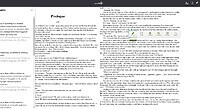We’ve probably all been there. We come across a great book by a new author, and immediately seek out our new favorite writer on social media. After connecting, the truth comes out: this person is not who we thought they were based on their ability to craft a wonderful story. Their Facebook feed may be filled with shared memes that go against our political and religious views, and their Twitter retweets paint a picture of someone who’s views violate the core ideals we hold dear.
It’s worse than losing the author to death, in some way, because it not only ruins the book we just read, it ruins our choice to ever read another word this author may write. It’s not just that there won’t be more books, but that there will be more books and we’ve chosen to avoid them.
But that doesn’t mean all authors can reconcile the sound business advice–namely, staying quiet about sensitive topics–with what they see as a raging dumpster fire in every direction. For some authors, the possibility of losing book sales doesn’t “trump” voicing their concerns to potential voters and activists.
Summer Devon, a prolific and rather successful author of M/M romance, has specifically been called out for her very public stance on the current state of affairs.
“I would rather not be so wrapped up in this, but every morning I wake up and find something else I consider a threat. I also worked with refugees for ten years, so I’m very adamant about their rights,” Devon explained. “It stopped being about vague rights and became about actual people who’ve lived through the horrors of war. I can’t imagine anyone with a heart turning their back on them if they had a chance to actually meet and talk to them.”
But can that come back to haunt the author in terms of an alienated readership, poor sales, and the common tactic of writing “revenge reviews?” Absolutely.
“As an author, it’s important to keep your personal opinions regarding politics and religion separate from your public opinions. Why? You risk alienating your current reader base as well as potential readers,” explains branding expert Rachel Thompson, founder of Bad Redhead Media and author of 30-Day Book Marketing Challenge. “The best way to achieve this is to have a personal Facebook (set to ‘Friends’ or create personalized lists) and a public author page. Post non-political and non-religious posts on your author page. If you must discuss politics that you feel might be volatile in nature, form what Facebook refers to as a ‘secret’ group, which means nobody sees your posts but you and other members of the group; additionally, your posts cannot be shared. These groups are great for discussion, support, and planning purposes.”
Thompson, who is herself an advocate for women’s rights and the prevention of sexual abuse, has faced unspeakable backlash on her personal pages and accounts for her stance against this kind of violence, so this isn’t merely some tongue-in-cheek advice about keeping your mouth shut.
“In my own personal experience as a nonfiction author, activist, and advocate, the line does often blur. I’m also a businessperson who works with authors, so I’m hyper-aware of these issues however, I keep tightly to these boundaries: no politics or religion on my author or business pages, ever.”
Mercy Pilkington is a Senior Editor for Good e-Reader. She is also the CEO and founder of a hybrid publishing and consulting company.

